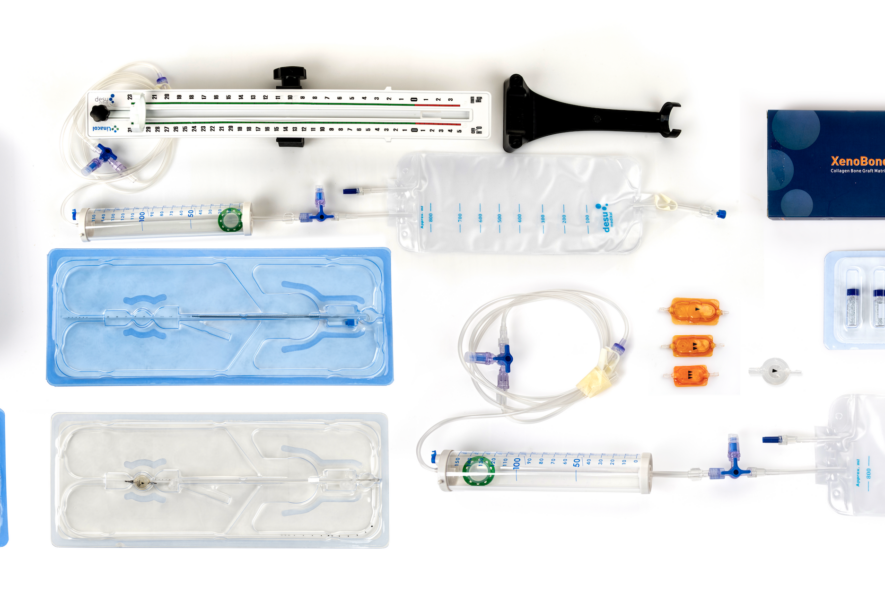
Hydrocephalus is a life-threatening condition that demands fast and precise medical intervention. The most trusted method to control excess cerebrospinal fluid (CSF) is through the use of Ventriculoperitoneal Shunts.
Neurosurgeons worldwide choose Ventriculoperitoneal Shunts because these devices offer a safe, reliable, and long-term solution for hydrocephalus management.
Leading medical device manufacturer Desu produces cutting-edge Ventriculoperitoneal Shunts that deliver consistent clinical success.
Are you ready to offer your patients the safest hydrocephalus treatment? Explore Desu’s advanced Ventriculoperitoneal Shunts today.
What Are Ventriculoperitoneal Shunts?
Ventriculoperitoneal Shunts drain excess CSF from the brain’s ventricles into the peritoneal cavity, where the body reabsorbs the fluid naturally. This technology prevents dangerous pressure build-up within the skull.
Every hospital seeking premium hydrocephalus treatment options needs access to superior Ventriculoperitoneal Shunts — and Desu delivers exactly that.
Why Are Ventriculoperitoneal Shunts So Effective?
Desu’s Ventriculoperitoneal Shunts perform multiple critical functions:
-
Maintain optimal intracranial pressure
-
Prevent over-drainage and under-drainage
-
Minimize infection risks
-
Offer adjustable pressure systems for personalized treatment
-
Ensure long-term durability
Hospitals searching for next-generation Ventriculoperitoneal Shunts should contact Desu for industry-leading solutions.
Key Components of Ventriculoperitoneal Shunts
Desu manufactures Ventriculoperitoneal Shunts with the following essential parts:
-
Ventricular catheter for CSF collection
-
High-performance valve for pressure control
-
Distal catheter for fluid drainage into the peritoneal cavity
Every element of Desu’s Ventriculoperitoneal Shunts is engineered for accuracy, safety, and longevity.
Advantages of Desu’s Ventriculoperitoneal Shunts
1. Long-Lasting Intracranial Pressure Control
Desu’s Ventriculoperitoneal Shunts use advanced valve mechanisms to deliver stable pressure regulation for years after implantation.
2. Infection Prevention Technology
Desu enhances its Ventriculoperitoneal Shunts with antibiotic-impregnated silicone materials, reducing post-surgical infection risks significantly.
3. Pediatric and Adult-Specific Designs
Desu customizes its Ventriculoperitoneal Shunts for different age groups, offering perfect solutions for infants, children, and adults.
4. Adjustable Pressure Valves
Neurosurgeons can easily adjust Desu’s Ventriculoperitoneal Shunts post-surgery, ensuring flexible treatment for changing patient needs.
For safe and customizable hydrocephalus treatment, hospitals rely on Desu’s innovative Ventriculoperitoneal Shunts.
Where Are Ventriculoperitoneal Shunts Used?
Doctors implant Ventriculoperitoneal Shunts for patients suffering from:
-
Congenital hydrocephalus
-
Acquired hydrocephalus (due to tumors, infections, trauma)
-
Normal Pressure Hydrocephalus (NPH)
-
Post-hemorrhagic hydrocephalus
Hospitals treating any of these conditions must ensure they stock Desu’s world-class Ventriculoperitoneal Shunts.
Why Neurosurgeons Trust Desu for Ventriculoperitoneal Shunts
Desu has become a global leader in medical device manufacturing by offering:
-
CE Certified Ventriculoperitoneal Shunts
-
ISO 13485 compliant production
-
High-quality biocompatible materials
-
Innovative valve technologies
-
Outstanding clinical support
Upgrade your medical supply with Desu’s reliable Ventriculoperitoneal Shunts.
Doctor Testimonials: What Experts Say About Desu
“Desu’s Ventriculoperitoneal Shunts provide unmatched safety and precision. My patients recover faster with fewer complications.”
— Dr. Mehmet A., Neurosurgeon, Turkey
“In pediatric cases, Desu’s Ventriculoperitoneal Shunts offer perfect pressure control and infection resistance.”
— Dr. Elena P., Pediatric Neurosurgeon, Spain
Ready to experience the highest standard of care? Contact Desu for your next Ventriculoperitoneal Shunts order.
How to Buy Ventriculoperitoneal Shunts from Desu
Desu provides a seamless ordering process for hospitals, clinics, and distributors seeking superior Ventriculoperitoneal Shunts.
Visit: desu.tr
Email: [email protected]
Desu’s customer service team assists healthcare providers with:
-
Product details
-
Technical support
-
Custom shunt system requests
-
Fast international shipping
Don’t wait — ensure patient safety with a trusted Ventriculoperitoneal Shunts buy from Desu.
Desu Leads the Future of Ventriculoperitoneal Shunts
The medical industry evolves rapidly, and so do the expectations of healthcare professionals and patients. Desu meets this challenge head-on with its innovative, safe, and effective Ventriculoperitoneal Shunts.
Hospitals that prioritize patient safety, surgical success, and long-term outcomes choose Desu for their Ventriculoperitoneal Shunts buy.
Take action today. Partner with Desu for your next Ventriculoperitoneal Shunts buy and elevate your hydrocephalus treatment standards.
FAQs About Ventriculoperitoneal Shunts
1. What are Ventriculoperitoneal Shunts used for?
Doctors use Ventriculoperitoneal Shunts to treat hydrocephalus by draining excess cerebrospinal fluid (CSF) from the brain into the peritoneal cavity. This process helps control intracranial pressure and prevents serious neurological complications.
Desu designs advanced Ventriculoperitoneal Shunts for safe and effective hydrocephalus treatment.
2. How long do Ventriculoperitoneal Shunts last?
High-quality Ventriculoperitoneal Shunts can last for several years, depending on the patient’s condition and shunt care. Desu manufactures durable Ventriculoperitoneal Shunts using biocompatible materials to ensure long-term reliability.
Hospitals trust Desu for long-lasting Ventriculoperitoneal Shunts.
3. Can Ventriculoperitoneal Shunts be adjusted after surgery?
Yes, neurosurgeons can adjust the pressure settings of Desu’s Ventriculoperitoneal Shunts post-surgery. This feature allows personalized treatment and optimal CSF drainage for each patient.
Desu’s adjustable Ventriculoperitoneal Shunts offer flexibility and clinical precision.
4. What complications can occur with Ventriculoperitoneal Shunts?
Potential complications include infection, blockage, or over-drainage. However, Desu minimizes these risks by producing Ventriculoperitoneal Shunts with antibiotic-impregnated silicone and advanced valve technology.
Protect your patients with Desu’s infection-resistant Ventriculoperitoneal Shunts.
5. Who needs Ventriculoperitoneal Shunts?
Patients diagnosed with hydrocephalus — whether congenital, acquired, or tumor-related — often require Ventriculoperitoneal Shunts. Desu provides tailored shunt solutions for pediatric and adult patients.
Choose Desu for safe and effective Ventriculoperitoneal Shunts for all age groups.
